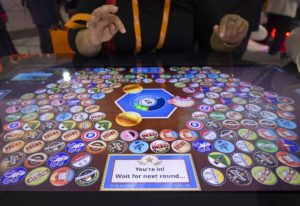Slot machines have always ruled the gaming floor at Rivers Casino on the North Shore.
But casino executives are betting on arcade-style games and so-called party pits to attract younger gamblers.
The thinking is that the industry will need to offer games that look and feel different to engage the millennial generation.
“They’re so surrounded by awesome technology all the time that the concept of a slot machine is boring to them,” said Marcus Yoder, vice president of sales at Gamblit Gaming, a California company that develops digital games for casinos.
According to the American Gaming Association, young people ages 21 to 35 visit casinos more than any age group. Yet just 2 percent of millennials play the slots.
“Even though the slot machines that are out there are beautiful machines with fantastic graphics, it’s still the function of pressing a button and waiting to see what happens,” Yoder said. “And that’s just not interesting.”
Lawmakers in Nevada, New Jersey and Massachusetts have passed legislation to allow casinos to offer arcade-style games.
Pennsylvania’s House of Representatives approved similar legislation in June, but the Senate has yet to act on the bill.
The legislative session ends Nov. 30, after which all bills die.
State Rep. George Dunbar, a Westmoreland County Republican and the bill’s primary sponsor, said he likely would reintroduce the bill next session.
“They have to continue to reinvent themselves,” Dunbar said of casinos. “One way to reinvent themselves is to find things the younger generation is used to and want to participate in.”
Gamblit’s video games combine skill and chance.
In Smoothie Blast, players fill a blender with fruit. Filling the blender faster with different combinations of fruit results in a larger payout.
There still is a house advantage, but players experience greater wins as they get better at the game.
Some manufacturers are developing tabletop games in which two or three people play at one time. Others are investing in virtual gaming.
“All of those could be in our future,” said Andre Barnabei, vice president of slot operations at Rivers Casino.
Research has found that millennials want their casino experience to be social. They often come to a casino with friends and socialize while gambling, said Shannon Redmond, vice president of marketing at Rivers Casino.
Baby boomers are the exact opposite.
“They have no problem coming to the casino by themselves,” Redmond said. “And they like the choice where they can say, ‘I want to sit at this slot machine and not talk to anybody. Or if I feel like being social today, I can talk to my neighbor.’ ”
Rivers Casino has a party pit on Thursday nights that caters to younger players. The atmosphere is more social, and the average wager is lower. You can play blackjack and other table games for only $5 a hand.
Nick Thrash, 21, of Baldwin Borough goes to the party pit every week with friends. They usually spend about two hours at the casino.
Sometimes, Thrash will play the slots, but he prefers blackjack.
“You feel like you’re in control of your money a little more,” he said. “Plus, you get to sit down with your friends and have a few beers.”
Many casinos have added nightclubs, upscale restaurants and shopping centers to draw in young people, said I. Nelson Rose, a professor at Whittier Law School in Orange County, Calif., who blogs about trends in the gaming industry.
“Millennials like good food and music, so the bars and restaurants are filled. But the gaming floor is often empty,” Rose said. “They need to figure out ways to either get millennials to go down to the casino floor or bring the casino floor to the millennials.”
Some West Coast casinos have begun handing out portable devices that serve as slot machines. They are about the size of an iPad, Rose said.
Guests can sit in the sports lounge with their friends, and they have a slot machine in their lap.
“They don’t want to sit in front of a metal box with spinning wheels in a building the size of a warehouse,” Rose said. “The industry is looking around for whatever they can.”
 By Tony Raap, The Pittsburgh Tribune-Review (TNS)
By Tony Raap, The Pittsburgh Tribune-Review (TNS)
